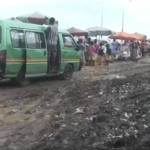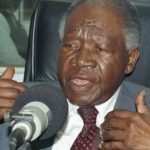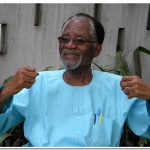On Party And National Interests
Posted by By Akogun Akomolafe at 5 June, at 22 : 00 PM Print
Warning: count(): Parameter must be an array or an object that implements Countable in /home/alaye/public_html/wp-content/themes/Video/single_blog.php on line 46
Warning: count(): Parameter must be an array or an object that implements Countable in /home/alaye/public_html/wp-content/themes/Video/single_blog.php on line 56
We in Africa lend great credence to the saying that new converts make the worst zealots. We appear to do nothing but take foreign ideas we barely understood, copy them blindly, use and abuse them, and turn ourselves into grotesque caricatures. Little wonder we are the laughing stock of the world.
Let us take this Christianity thing as an example. Starving Europeans, escaping hunger, left their desolate, god-forsaken icy abodes to invade our land. They brought with them their brand of religion and the book they claim their god wrote for them. Although we find their notion of god at variance with our own conception, they managed to persuade some of our folks to embrace their faith.
After much struggle, political agitation, and open warfare, the Europeans finally left for their shores.
Fifty some years later, a European visiting our land will barely recognize the Christianity that our people practice as the same one that he introduced to us.
In his country, the European knows that people go to church only on Sundays. And on that day, they spend only about one hour in service and go back to their homes until the following Sunday. Even on that day of worship, the churches in Europe are quiet, the service a somber affair to afford people the opportunity to commune silently and directly with their god.
A European that went to the streets of Europe to make noise about his god would be deemed insane and consigned to a lunatic asylum. No European, in his right senses, would disturb his neighbor because he wants to praise his god.
The European will be confounded to see that in Africa we practically live in churches nowadays. There is a church of one description or the other in every square meter of Africa.
African Christians believe that national laws are of no significance when it comes to worshipping their new god. Laws on not establishing churches in residential areas are flouted with impunity. Ordinances against street worship or conducting religious services in public transport are broken with abandon. Church services in Africa have become giant noise-making affairs where laws and orders are broken willfully as men and women profess their version of piety.
Christianity is everywhere on our beloved continent — in the churches, homes, streets, markets, farms. No place is spared in the new business of Christian evangelism sweeping across Africa.
No bus leaves a station until a Christian prayer is said. Shouts of “Thank you, Jesus,” fill the air as planes touch down on our tarmacs. Today, no state occasion takes place until a Christian priest invokes the blessings of his god.
There are churches on every street of the land and, as though that were not enough, mobile preachers are on every street corner to proclaim the good tidings. Not to be outdone is the sect founded by the racist Joseph Smith Jr., Latter Day Saints, whose members traverse the land on their bikes to peddle their version of racist doctrines.
To top it off, our president proclaimed that his god is now the leader of the country, and that he had no regret to make Jesus the president. I still wonder why a smart lawyer has not deemed it right to drag Mr. President to court to explain what he meant by that clearly provocative statement.
Let’s turn to politics, especially this thing called democracy.
Once again, it was the Europeans that brought their system of government into their newly-conquered territories. And were a European to come visiting us, he would be astounded to see what mess we have made of the simple affair of governance.
In his land, the European sees a clear demarcation of line — the political class spends its time debating political matters while the rest of the people go about their own business, until election time when people of a certain age are called upon to perform the civic duties of voting.
To ensure that national life is not brought to a standstill, the Europeans fixed the periods for which electioneering is allowed to take place — mostly every four years.
Let’s look at what we have in Africa. We, here I mean everyone, practice politics 365/12/31/7/24.
We do nothing but politics in Africa. Everyone, including the media, is full of it. There is no break between elections where and when people could pause to catch their breath. Like the religion we took over and badly abused, we have taken over Western democracy and mauled it.
A visiting European will be astounded to see the amount of time, energy, resources, and money we expend on doing our brand of politics. One hardly sees elections in Europe erupting into violence, but in Africa, elections are not deemed fit and proper unless they are accompanied by blood-letting, mayhem and, sometimes, civil and uncivil wars.
Two point something years into their term, the ruling National Democratic Congress (NDC) is self-conflagrating with factions spewing insults a million a yard. Things got to the extent that the president had to dragoon members of his cabinet to proclaim their fidelity on national television. Not even the erstwhile Soviet Union could have managed such public political masturbation.
But this is GH, right? Anything and everything goes. Anything can happen in politics here. That explains why no one sees the huge irony in a president that requires very public endorsement from the people he picked to assist him.
Meanwhile, the rumpuses in the NDC continue unabated with accusations and counter-accusations of bribery, intimidation and secret tapes flying around. It is a great shame, indeed!
Not to be outdone, the opposition New Patriotic Party (NPP) believes that in order to maintain relevance it must also make its own obstreperous noises.
In Europe, serious opposition parties take ruling parties programmes to the shredder whilst proffering alternatives, but this is not the case in Ghana Inc.
It would be cheering news were the NPP to be offering alternative programmes into which we can sink our teeth. But, as this is GH, people are interested only in the inanity, the crass, and the utterly mundane.
So what did the NPP do except to announce the mind-boggling news that it’d be recruiting 420,000 volunteers to fight the next elections.
This is what the party’s mouthpiece, the Statesman, informed us: “In line with its Victory 2012 philosophy of running a ‘total grassroots campaign,’ the New Patriotic Party will form a 20-member campaign team in each of the 21,000 odd existing polling station areas across the country.
“This translates into a nationwide official canvassing team of more than 420,000 volunteers. No party in Ghana has the width and depth of structures that we have. So we intend to use the structures and personnel optimally and work hard and smart for victory in December 2012.”
Already, the party has five executives per polling station area, comprised of a chairperson, secretary, organizer, women’s organizer, and youth organizer.
Fifteen others will be selected to join, complimenting the personnel of the existing structure. Ten of them will be selected by the 2012 presidential candidate and five by the parliamentary candidate of each of the 230 constituencies. The message from the campaign manager to the candidates is simple, “select those who will do the job and not just those you like.”
The 2008 voter register pegged the number of registered voters at 13,278,941. Therefore, on average each of the 21,032 recognised polling stations in Ghana has an average of 631 registered voters within its catchment area.
This makes each member of the 20 polling station canvassing team responsible for approximately 32 registered voters, making it easier for the party to “deliver its message directly and deploy resources efficiently.”
Boakye Agyarko, Nana Akufo-Addo’s Campaign Manager, makes the point that the 2012 NPP campaign “will be scientific and intimate.”
In a country of twenty-something million people, 420,000 is a lot of people. If a political party can mobilise that staggering number just to fight elections, why is it impossible for the national government to mobilise a million, even two million people to help tackle some of the seemingly intractable problems besetting the nation?
There is shortage of potable water in several parts of the nation’s capital, Accra. In several parts of the country, electricity generation and distribution remain epileptic. Accra, despite all the energetic efforts of the mayor, remains an eyesore with several of the waterways choked full with dirt and garbage. And despite having three ministers in the ministry of agriculture, Ghana Inc. still expends vast money on the importation of food.
None of these developmental challenges seem to bother our elected officials and the political class. They appear to be interested only in elections.
It is time we really start to ask what exactly is wrong with us in Africa. Why do we engage our abilities and capacities in utterly useless endeavours and expect the rest of the world to come and save us? Why do we not ask ourselves what would happen were the rest of humanity to waste their own time on useless frivolities like we do?
In the piece, “Why can’t we also dream BIG,” I wrote, inter alia:
What struck me the most was that none of the projects was in Africa; none of them was conceived by Africans.
From the Cape to Cairo, from Algeria to Zimbabwe, no African nation is thinking big; none is engaged in any big idea. In none of Africa’s 53 countries are the people mobilized to solve one of the myriad problems confronting the people.
The pungent question that immediately agitated my mind was: why can’t we Africans also dream big? What exactly is it with us that our minds are not also agitated to build big things? Why are we no longer participating at the highest levels of science and engineering? Why do our cities lack eye-pleasing parks, fountains, swimming pools, libraries, monuments, and other imprints of our passing through this life?
Our ancestors left their huge imprints in the sands of history. We have their Pyramids in Sudan and Egypt to attest that they did great things. What are we leaving behind?
If it’s true that the future belongs to those that believe in the beauty of their dreams, why are we Africans not also dreaming big? We are we not following our dreams? Why are we not agitated to leave behind solid legacies of achievements? Why are those leading us not mobilizing us to aim higher? Why our lives still consume by the mundane, the inanities, the senseless and mind-boggling pettiness?
Let’s get something straight: I am not in any way advocating that we copy European’s path of irrational development, or that we pursue the mindless rat race of the West, or turn our habitats into concrete jungles like they did in Europe. But there are some very basics things in our lives that our intellect should challenge us to improve.
Most parts of Africa enjoy year-round sunshine — why then do most Africans lack access to cheap solar energy? Why can’t all the universities and polytechnics in Africa come up with dirt-cheap solar lanterns for our people? Why can’t any leader in Africa simply determine that enough is enough and give a challenge to African scientists to come up with a solution? Why are all the rich people in Africa uninterested in solving a single problem?
About the Author
Femi Akomolafe is a passionate Pan-Africanist. A columnist for the Accra-based Daily Dispatch newspaper and Correspondent for the New African magazine. Femi lives in both Europe and Africa, and writes regularly on Africa-related issues for various newspapers and magazines.
Femi was the producer of the FOCUS ON AFRICANS TV Interview programme for the MultiTV Station.
He is also the CEO of Alaye Dot Biz Limited Dot Biz, a Kasoa-based Multimedia organisation that specialises in Audio and Video Production. He loves to shoot and edit video documentaries.
His highly-acclaimed books (“Africa: Destroyed by the gods,” “Africa: It shall be well,” “18 African Fables & Moonlight Stories” and “Ghana: Basic Facts + More”) are now available for sales at the following bookshops/offices:
- Freedom Bookshop, near Apollo Theatre, Accra.
- The Daily Dispatch Office, Labone – Accra
- WEB Dubois Pan-African Centre, Accra
- Ghana Writers Association office, PAWA House, Roman Ridge, Accra.
- African Kitchen in Amsterdam Bijlmer
Where to buy them online:
On Lulu Books:
18 African Fables & Moonlight Stories https://goo.gl/Skohtn
Ghana: Basic Facts + More: https://goo.gl/73ni99
Africa: Destroyed by the gods: https://goo.gl/HHmFfr
Africa: It shall be well: https://goo.gl/KIMcIm
Africa: it shall be well
on Kindle books: https://www.createspace.com/4820404
on Amazon books: http://goo.gl/QeFxbl
on Lulu Books: https://goo.gl/SQeoKD
Africa: Destroyed by the gods
on Kindle books: https://www.createspace.com/4811974
on Amazon books: http://goo.gl/1z97ND
on Lulu Books: http://goo.gl/KIMcIm
My Lulu Books page: http://www.lulu.com/spotlight/FemiAkomolafe
Get free promotional materials here:
- Africa: it shall be well: http://alaye.biz/africa-it-shall-be-well-introduction-in-pdf/
A FREE Chapter of ‘Africa: It shall be well’ could be downloaded here: http://alaye.biz/africa-it-shall-be-well-a-free-chapter/
- Africa: Destroyed by the gods (How religiosity destroyed Africa) http://alaye.biz/africa-destroyed-by-the-gods-introduction/
A FREE Chapter of ‘Africa: Destroyed by the gods’ could be downloaded here: http://alaye.biz/africa-destroyed-by-the-gods-free-chapter/
Contact Femi:
Femi’s Blog: www.alaye.biz/category/blog
Website: www.alaye.biz
Femi on Amazon https://www.amazon.com/author/femiakomolafe
Twitter: www.twitter.com/ekitiparapo
Facebook:https://www.facebook.com/alayeclearsound;
Gmail+: https://plus.google.com/112798710915807967908;
LinkedIn: www.linkedin.com/in/femiakomolafe
Email: fakomolafe@gmail.com
Kindly help me share the books’ links with your friends and, grin, please purchase your copies.
Comradely,
Femi Akomolafe




